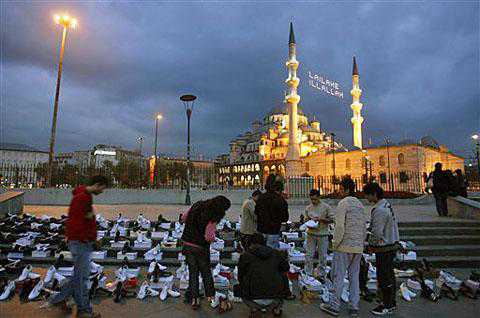Publication: Eurasia Daily Monitor Volume: 6 Issue: 175September 24, 2009 By: Emrullah Uslu
General Ilker Basbug
As Turkey has recently concentrated on the debate over whether the Justice and Development Party’s (AKP) Kurdish initiative to end the long running campaign of violence, the two key actors in the conflict, the Turkish military and the Kurdistan Workers’ Party (PKK) have entered the debate. The Chief of the General Staff, General Ilker Basbug visited troops in the Kurdish populated part of the country and shared the views of the Turkish Armed Forces (TSK). Basbug said that fighting against terrorism requires time and patience as well as pursuing every possible option aimed at ending the use of political violence. Regarding the Kurdish initiative, Basbug explained that the TSK supports the government’s policy (Star, September 23)
The opposition Republican Peoples Party (CHP) reacted negatively to Basbug’s statement. The Deputy Chairman of the CHP, Hakki Suha Okay stated that the CHP does not approve of the TSK’s involvement in politics (www.nethaber.com, September 23).
The critical issue is how and to what degree the TSK will support the Kurdish initiative. Indeed, the PKK has often asserted that if the TSK ends its combat operations against it in the mountains it will reciprocate by no longer targeting Turkish military units or civilians in the region (Radikal, September 13). Yet, the TSK does not consider this offer as a viable option to end the conflict. In fact, on September 14 the TSK applied to the Turkish parliament to prolong its mandate to conduct military operations in northern Iraq (NTV, September 18). Prime Minister Recep Tayyip Erdogan has declared that his government will review the TSK’s request and ask parliament to extend the mandate which authorizes the TSK to conduct operations in Iraqi territory (Star, September 22).
While the Turkish actors have concentrated on the Kurdish initiative process, Kurdish actors have adopted a more skeptical view. Ahmet Turk, the Chairman of the pro-Kurdish Democratic Society Party (DTP) criticized the AKP for not addressing the root causes of the problem, but instead presenting the state’s traditional position toward the Kurds as if it were a new initiative.
At this critical moment, the PKK announced its decision to extend its unilateral ceasefire for the fourth time this year. The PKK issued a press statement criticizing the AKP’s Kurdish initiative for not recognizing Abdullah Ocalan, the imprisoned leader of the PKK as a negotiating figure, or suspending counter-terrorist operations conducted against its militants in mountainous areas (Firat News Agency, September 23).
The PKK’s decision to extend its ceasefire will potentially impact positively on the Kurdish initiative for two reasons. First, it will allow the government and the DTP to prepare the psychological basis for a possible peace settlement. The main obstacles, however, are the funeral ceremonies for Turkish soldiers and PKK militants. In recent years sharp divisions have existed over how to organize such funerals. For instance, on September 23, 50,000 Kurds attended the funeral of a PKK militant (ANF News Agency, September 23). Similarly, approximately 40-50,000 Kurds attended another funeral on September 13 in Hakkari province (Firat News Agency, September 13).
The funerals of Turkish soldiers have become places of protest against the PKK and even the government. On September 10, there were three funerals held for soldiers in various Turkish provinces. In Kirsehir province 5,000 people attended, in Siirt province 3,000, and in Kutahya 10,000 (Vatan, September 10). To a certain degree, these funeral ceremonies have recently become contested zones for the Turkish and Kurdish communities, which serve to further divide both societies. Thus, the PKK’s decision to extend its ceasefire will help the political actors involved in the peace process to ease these tensions.
Moreover, the extension of the PKK’s ceasefire will allow time for the political actors involved to agree on the details of any possible peace. One of the problems for the government is to implement the Kurdish initiative rapidly, since the debate on the issue has raised expectations among ordinary citizens. As the process has unfolded, popular support has thus been tested. Therefore, the PKK’s decision to extend its ceasefire provides an additional opportunity for the Turkish government to widen support for the Kurdish initiative. Nevertheless, it is too soon to speculate on whether the process will prove successful, since many factors might yet serve to disrupt the initiative.
https://jamestown.org/program/turkish-military-supports-the-governments-kurdish-initiative/

